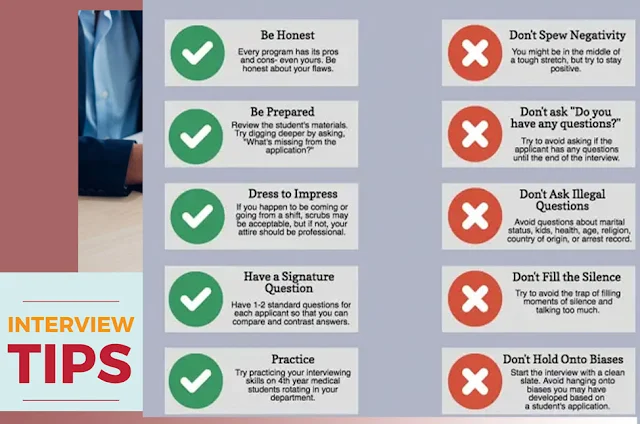Tips for answering question about education in a interview:
Answering interview Question about
education, in what course did you get the worst grades? Why? How do you think
that will affect your performance on this job?
 |
| Tips for answering question about education in a interview |
When addressing interview questions about
courses where you received the worst grades, it's essential to respond honestly
while emphasizing your growth and ability to overcome challenges. Here are some
advices to help you answer this question efficiently:
Interview Tip 1 Be honest and transparent:
Start by acknowledging the courses in
which you struggled or received low grades. Honesty is important, as employers
value integrity and the ability to recognize areas for improvement.
Interview Tip 2 Focus on the reasons:
Explain the factors that contributed to your lower grades in those
particular courses. Was it a challenging subject matter, lack of interest,
difficulty with the teaching style, or personal circumstances? Highlight any
relevant challenges you faced during that time, such as heavy workloads or
personal responsibilities.
Interview Tip 3 Showcase self-awareness and growth:
After discussing the reasons for your
lower grades, emphasize how you've learned and grown from those experiences.
Describe the steps you took to improve your understanding of the subject matter
or overcome the challenges you faced. Highlight any additional efforts you
made, such as seeking extra help, engaging in self-study, or taking related
courses to enhance your knowledge.
Interview Tip 4 Relate it to the job:
Draw connections between the skills and knowledge required for the job you're applying for and the courses in which you struggled. Explain how you've taken steps to address those weaknesses and build the necessary competencies. Demonstrate how your subsequent performance or achievements in related areas indicate your ability to excel in the desired role.
Interview Tip 5 Highlight strengths and achievements:
Shift the focus from your weaker grades to your overall academic or professional achievements. Discuss courses or projects where you excelled, highlighting your strengths and the positive outcomes you achieved. This demonstrates that your performance in specific courses does not define your abilities as a whole.
Interview Tip 6 Emphasize your determination and resilience:
Emphasize your determination to overcome obstacles and your willingness to put in extra effort to succeed. Discuss instances where you demonstrated resilience and perseverance, both academically and professionally. This reassures the interviewer that you possess the drive and commitment required to overcome challenges in the workplace.
Interview Tip 7 Express your commitment to continuous learning:
Convey your dedication to
ongoing self-improvement and your willingness to acquire new skills and
knowledge. Share examples of how you've pursued learning opportunities outside
of formal education, such as online courses, workshops, or relevant
certifications.
Remember, the goal is to demonstrate
self-awareness, growth, and the ability to learn from setbacks. By focusing on
your strengths, achievements, and proactive measures to overcome challenges,
you can present yourself as a resilient and determined candidate who is capable
of performing well in the desired job.
Interview Tip
1 Prioritize relevant activities: Focus on
extracurricular activities that are directly related to the skills and
qualities required for the position you're applying for. For example, if you're
applying for a leadership role, highlight activities where you held leadership
positions or participated in team-oriented projects.
Interview Tip 2 Showcase a variety of
activities: Include a range of extracurricular
activities to demonstrate your diverse interests and well-rounded nature. This
could include involvement in sports, clubs, volunteering, community service,
arts, or academic organizations. However, make sure to emphasize the activities
that align with the job requirements.
Interview Tip 3 Highlight leadership
roles: If you held any leadership positions within
extracurricular activities, such as being a team captain, club president, or
event organizer, be sure to mention them. Leadership experience showcases your
ability to take charge, make decisions, and collaborate with others.
Interview Tip 4 Discuss accomplishments
and impact: Describe specific accomplishments or
contributions you made during your involvement in extracurricular activities.
Focus on outcomes, such as organizing successful events, leading a team to
victory, or initiating positive changes within the organization. This
highlights your ability to set goals, work towards them, and achieve results.
Interview Tip 5 Connect skills gained to
the job: When discussing your extracurricular
activities, emphasize the skills you developed or enhanced through those
experiences. Draw connections between those skills and the requirements of the
job you're interviewing for. For example, if you participated in a debate club,
highlight how it honed your public speaking and critical thinking abilities.
Interview Tip 6 Discuss time management and commitment: Talk about how you managed your time effectively to balance your extracurricular activities with your academic or work responsibilities. This demonstrates your ability to multitask, prioritize, and maintain commitment.
Interview Tip 7 Show passion and
enthusiasm: When discussing your extracurricular
activities, convey your genuine interest and enthusiasm for those pursuits.
Passionate involvement indicates your drive, dedication, and willingness to go
the extra mile.
Interview Tip 8 Be prepared to elaborate: Anticipate follow-up questions about your extracurricular
activities and be ready to provide more details or anecdotes. This allows you
to further showcase your skills and demonstrate how your experiences have
shaped you.
Remember to tailor your response to align
with the specific job requirements and company culture. By highlighting
relevant activities and demonstrating the transferable skills you gained,
you'll present yourself as a well-rounded candidate with a strong work ethic
and valuable experiences beyond the classroom or workplace.







1 Comments
It is imporant to respond accurately with relevent example. Most of the time we just mentioned our degrees instead of telling what actually we learned from those classroom and how it relevent to the job we are applying.
ReplyDeletePlease do not entry any spam link in comment section